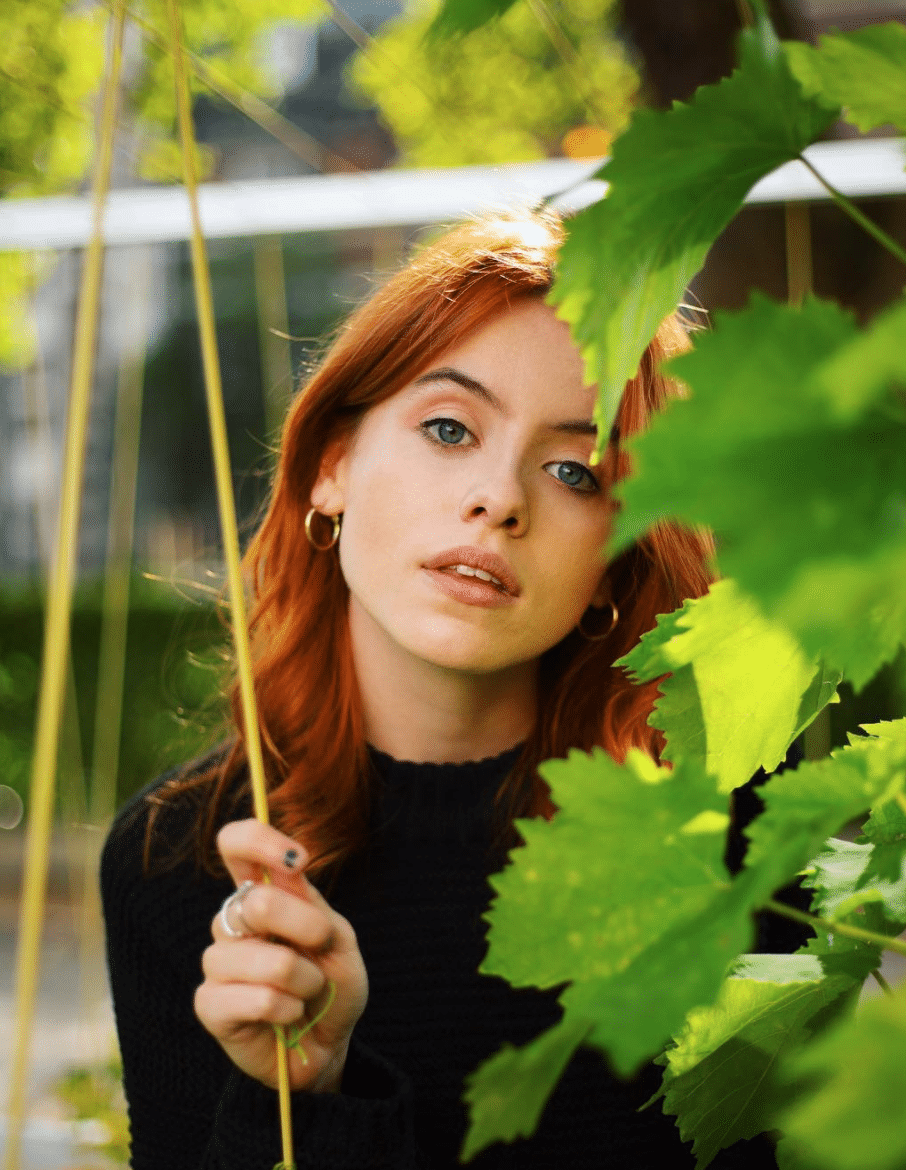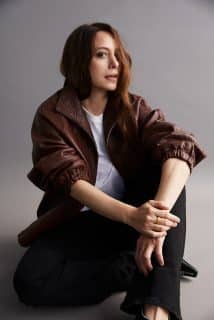Rosie Day on ‘Instructions for a Teenage Armageddon’
Culture
Rosie Day, actor, director, writer, tells us about her new book 'Instructions for a Teenage Armageddon' and her new film 'Real Love'.
Rosie Day is still in her twenties but as a former child actor she has been around long enough to have not simply appeared in a succession of quality shows and films – including ‘Outlander’, ‘Call The Midwife’, and ‘Down a Dark Hall’ – but to have also expanded out into writing and directing. She is forging her own path in a way that is testament to her own talents as well as an industry that seems to be supporting young female voices in a way it never has before. As someone who has come of age in the public eye, Rosie also has an awareness of the struggles young women can face and works with stem4, a charity that supports teenagers with their mental health. In October she’ll release her first book, ‘Instructions for a Teenage Armageddon’, a very of-the-moment guide to getting through adolescence which features discussions about sexual harassment and consent as well as life advice. We spoke to Rosie as she was putting together a film version of the book to find out more about her truly inspirational work, and also the hotly tipped forthcoming film, ‘Real Love’…
What’s been happening over the last year in lockdown for you?
The industry started going back in about November, filming wise, so I was kind of lucky as I’ve had a couple of jobs filming back-to-back, a TV series and then a film. And then I did the ‘Call the Midwife’ Christmas special.
At the start we were all locked down obviously, but what was really great for me was that this book came about, so I spent lockdown writing and creating that. It was a really fun use of time when I was trapped at home.
You really were one of those people who actually wrote a book?
People have called me annoying. They’re like, ‘Oh, you really did that.’ And I’m like, ‘I didn’t mean to.’

Let’s start with the book then, how did that come about? Is it something you always wanted to do?
It started as a dare. I was doing a play in London, and the director dared me to write a one girl play that we could do together. I was away filming in Spain, and I wrote this play called ‘Instructions for a Teenage Armageddon’ that was on last year, and then is going on again at the end of this year. It’s all about a teenage girl’s real life experience.
We did the preview run and somebody came and saw it who introduced me to my now literary agents, and I went in for a meeting with them about how do we turn this into, like a movement to making teenage girls really empowered. We started off thinking of a podcast, and then they asked if I’d like to do a book. I write anyway, not books but scripts, so I said, ‘Sure, why not?’ We put together this nonfiction guide to surviving and thriving in your adolescent years. Like quite a lot of things in my life, it was a very happy accident that it appeared.
And you have contributors to it as well, is that right?
Yeah. We have people who are specialists in their field, like psychologists, doctors, some actors and amazing activists like the creators of Everyone’s Invited, the amazing platform reporting what’s going on in schools with sexual assault. Also, we’ve got Natalie and Naomi who run their platform Everyday Racism. So we have this huge breadth of amazing women who have dedicated their time to write on different topics that we thought had to be included within the book.
Because there’s obviously a lot of stories in the news at the moment. The stresses on sort of teenage girls are enormous mental health statistics in that sort of demographic are quite terrifying.
Well, the whole thing for me, the thing that started all this, was that in 2018 I read an article that said 1 in 4 teenage girls self-harmed. And that really shocked me because I thought if it was any other kind of group of people…it was affecting a quarter of a group of people in the UK, and it was the same in the U S as well.
I now work with a teenage mental health charity, so I have seen how teenagers are doing over the past year and I don’t think it’s ever really been tougher for them.
What other areas do you look at in it?
We have individual topics that goes from everything from mental health, friendships, relationships, families, consent, boundaries, helping young woman to not be boxed in, and to reach their potential.
And then each section has top tips. 10 top tips on mindfulness, 10 top tips on dealing with stress. 10 top tips on all sorts of different topics. And then we have profiles on amazing women of the world that we think young girls should know about, like Dolly Parton or Nicola Adams. And then and then we have quotes from amazing women. It really is like an all-inclusive guide of all the things young girls would need to know and that I wish I knew when I was growing up.
It sounds like the kind of thing that a lot of teenage boys should be reading as well…
Well, I have already said I would love to do a version for boys, with male contributors. Obviously, I’ve never experienced life as a teenage boy, but I know from my work for the charity that it’s really hard. So that’s definitely something that I’m really keen to do.
Can we move on to Real Love? Can you tell us about that?
So that is by a director called Jamie Adams, who works in a very interesting way that I’d never done before, where it’s essentially an improvised movie. He comes up with an idea for a story, gets a location, gets the actors, and then each scene is completely improvised. He has an idea of what should maybe happen in the scene, and then you, as an actor, just have to come in and make it up, essentially. Which was really, really interesting.
‘Real Love’ is about three people, which is myself, Sian Clifford, and Russell Tovey. Me and Sian are best mates, we’re David Bowie impersonators, and we meet this man on our bench where we drink every day, which is Russell. We’re broke and we come up with an idea that people get given money at weddings, so hatch the plan that Sian and Russell get married for cash. We put on a fake wedding and obviously, do they or do they not really fall in love?
It’s really funny, but it was really interesting for me because I was the youngest by quite a lot, and I knew these people’s work really well. I was quite intimidated because they’re all so good at it. I’d never in my life done improv before, so I kind of spent every day utterly terrified. Everyone was really lovely, but I think as the film goes on, I just look more and more tired because I was getting less and less sleep because I was so nervous. Working with Sian and Russell, they’re both so good at what they do, and I didn’t want to be the weak third link in this movie. I’ve not seen it yet, maybe I am!
That sounds quite terrifying. Were you hankering for a little bit of dialogue?
I think if it was a drama, maybe it’s easier. But with a comedy you’re so conscious of trying to make it funny, and if you’re not a comedian, you have to think on your feet. That was definitely tricky. By the end of it, I was like, somebody please give me a script. Let me just read some lines! But I’m excited to see it, though.
Do you still find that you’re learning stuff all the time and these different experiences and working with some of these other actors means you’re trying to absorb it all?
Yeah, always. I mean, I never went to drama school. Because I’m a former ‘child actor’, I just learned from watching other actors. For sure, I did that with Sian and Russell, they’re such pros. I think each job you do, you never really stop learning. You can always take something with you. Especially with theatre. Really each job I do is very different and with different people and often different genres. I’m really lucky, I just get to pick stuff up en route.
Is it quite a good time for to be an actor with so many streaming services as well as traditional channels? You can go from Outlander to Real Love and get all these different experiences….
I think there’s never been more content being made right now, which is amazing. And now everything’s opening back up again, there are definitely lots of opportunities. I think equally over the past, maybe 10 years, there are a lot more actors than there used to be. So the market is possibly very saturated. I would never recommend anybody be an actor! We always say when it’s good, it’s the best job in the world, and then when it’s bad, it’s awful or it doesn’t exist, I guess, when it’s bad, because you don’t have a job.
But I think, especially in telly, the scripts that are coming through for TV have never been stronger, and there’s lots of exciting opportunities.
Is it important for you to kind of have your own projects that you are writing, directing, developing within that framework of so much else going on?
I think, again, that kind of came as a bit of a surprise. I knew I probably wanted to give directing a go at some point, but I guess it was mostly about writing. I’ve always written stories just as a kid growing up and then I had the opportunity to start writing and then giving it a go directing. So I got to put my vision on screen. As a young woman, that was incredibly empowering, to suddenly realise that you could have a say in what you make. That’s been huge, it gives you some sense of control. Because in our lives of actors, we don’t have any control. We wait for the phone to ring and get told of where we should be and where to go. When you’re lucky enough to make your own work, and you’re helming it, that’s really fun. There are some amazing young female directors that are smashing it right now, and that’s really exciting – the industry is letting women in their 20s direct. Like Kate Herron, who’s doing the Loki series. And it’s like that’s really empowering to watch, because when I was growing up as an actor, I was so rarely directed by women. From the age of probably about 10 to 20, I think I maybe worked with three female directors. It was really rare.
Do you think in terms of stimulating change social media, on the positive side, has enabled a lot more support for young women out there?
We always end up talking about the social media and teenagers. I think it has hugely impacted mental health. We share everything now, but that means more people can find out about what work other people are doing. It’s really exciting that you can connect with other creatives. That’s good for this industry that you can kind of get to know people on Twitter, and that’s really cool. I guess it probably has played a part in making it more accessible.
In terms of managing your own sort of mental health and self care within your industry, do you have certain routines that you do?
You have to try to make time to look after yourself rather than trying to do everything all the time. My default process is to go, go, go, go, go. So I don’t have to stop and think about anything, which is probably really detrimental.
I do my work with stem4, and from working with them, I’ve picked up a lot. They have apps that you can use for anxiety, depression and a range of other things – just to have them on your phone if you’re feeling a bit anxious is really cool.
I probably should follow the practice what you preach thing more, where I should take my own advice that I give to young people. I wouldn’t say I’m great, I need to get better at it.
I eat a lot of cake, I take a lot of baths, and I found exercise is really, really good. I started running and found the endorphins thing is real.
I think mental health is something you continually work on, it’s not something that you can just fix. It’s always going to be ebbing and flowing. You just have to keep in tune with yourself and check in. And we always say keep talking, you have to be able to talk to people about how you feel.
I think that’s the number one – to have an open dialogue about how you are so when people ask you, you can make sure you tell the truth about how you feel.
Do you feel like you have a responsibility with your work. in order to be a good role model or be setting a good example by forging your own career, and showing other people what can be done?
For me, it’s about what can we do for young women and teenage girls. That’s something that’s really deeply rooted in the things that I write. That is at the core of what I want to do, because I really didn’t enjoy being a teenage girl, and I hate the idea that there are other teenage girls out there that felt the way I did.
It’s always been the case that I wanted to try and do something that genuinely makes a difference in their lives. I often felt really not listened to and overlooked, and my opinions didn’t matter. That’s something that I’m trying hard to sort out still.
But I don’t think I feel pressure about setting an example, you can only do the best that you can. I’m going to keep pushing forward with it. If this book helps one girl, then it’s worth it.
Is there anything that dads should be doing more of to help support their teenage daughters?
My dad is so interesting because I’ve got a big sister so my dad had two teenage girls at one point. And I can see it when girls reach a certain age, it an get a bit awkward. Around teenagers they don’t quite know what to do. I think the most important thing is to remain very normal and talk about everything that’s going on. The dad that know who are really good at it use a lot of humour around stuff. But just listening to them and letting them know that you are open to be talked to.
I think lots of girls shut their parents out anyway, or they maybe just focus on their mums. But dad likes to be included, too. I think my dad certainly sometimes felt left out by things when they are as concerned and want to be involved in your life as mums do.
It’s also then just accepting that sometime teenagers are can be upset about things, and you as a dad have to accept that and not get cross or react to everything, and just be led by your teenager. I think sometimes dads when they see their daughters growing up, they’re not quite sure what their role is anymore because it’s not like they can pick up and throw them in the air like they used to – all these changes are happening. I think just remaining neutral and keeping involved, that’s probably best.
‘Instructions for a Teenage Armageddon’ is out on 14th October. ‘Real Love’ is out later this year.
Main B&W portrat by Stewart Bywater.
Colour portrait by Esme Buxton.
Follow Rosie on Instagram:
Trending

Join The Book of Man
Sign up to our daily newsletters to join the frontline of the revolution in masculinity.

















